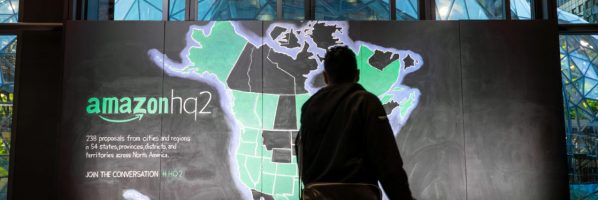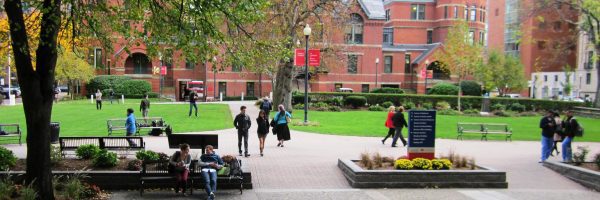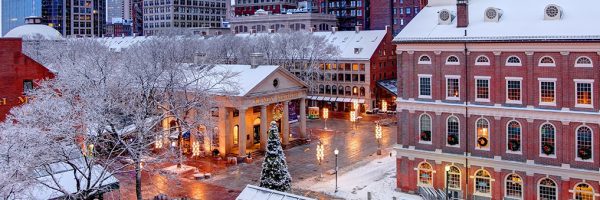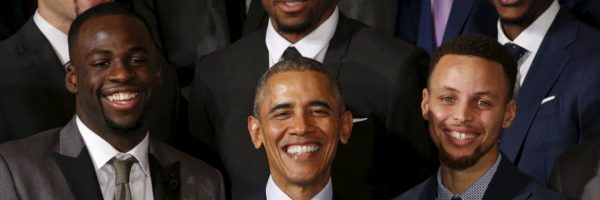Boston News: MIT Tackles Universal Basic Income, Negative Reviews, and More

Let’s visit some of the biggest news coming out of Boston business schools this week.
12-Year Study Looks at Effects of Universal Basic Income – MIT Sloan Newsroom
MIT Sloan School of Management associate professor Tavneet Suri, alongside nonprofit company GiveDirectly, will conduct a lengthy, 12-year study into the effects of the constant hot-button issue of universal basic income. UBI is a basic concept that an acting government will assist its citizens by distributing a recurring stipend, supplementing the loss of jobs to things like automation.
“Suri is conducting the research along with MIT professor Abhijit Banerjee, Princeton professor Alan Krueger, University of California San Diego professor Paul Niehaus, and GiveDirectly president Michael Faye. Overall, GiveDirectly expects to transfer $25 million to more than 21,000 people (not including the control group), 5,000 of whom will receive cash transfers for 12 years. The money comes with no strings attached.”
Read more about the extensive MIT UBI study here.
The Costs and Benefits to Responding to Negative Online Reviews – BU.edu
When BU Questrom marketing professor Georgios Zervas and USC’s Davide Proserpio looked into thousands of TripAdvisor reviews, they found a fairly surprising turn: hotel managers that actively engaged with reviewers, positive or negative, may have actually helped their overall ratings. Zervas notes that it actually diminished the number of negative reviews because users were more wary when they saw hotel staff members participating in a conversation.
However, the two found that the reversal cause of this interaction was that negative reviews who did leave reviews, after engaging with the hotel staff, tended to leave longer reviews—which often made the negative details much more elaborated and personal. Zervas notes this is still probably good overall, saying, “The remaining negative reviews are detailed and contain constructive feedback that [hotel management] can act upon.”

BU professor Georgios Zervas and USC’s Davide Proserpio found uniquely beneficial ways companies can utilize review sites like TripAdvisor.
Read more about BU Questrom’s study on TripAdvisor here.
What Could Amazon’s Approach to Health Care Look Like? – HBR
The Amazon, Berkshire Hathaway, and JP Morgan Chase venture to disrupt the healthcare industry led to a minor panic for other healthcare shareholders, but its potential impact is still fairly uncertain. HBR writer Robert S. Huckman and admitted Amazon shareholder recently explored the potential positive impacts, including simplifying a very complex U.S. healthcare prescription service industry, “simplifying data capture,” and the repeated effort from Amazon to improve its services to regular customers.
On the latter reason, Huckman explains, “Amazon has an internal challenge — managing the health and health spending of its employees — that is shared by many other companies. Yet Amazon likely does not have a full “solution” in mind just yet. Rather, it has ideas and hypotheses to test. By creating a space in which those ideas can be tested, Amazon may be able to play a key role in allocating resources to solutions that show themselves, over time, to be promising.”
You can read more about Huckman’s outlook for Amazon healthcare here.
Stay up to date with all news from the Boston metro, as well as our MetroMBA Boston twitter feed, today.
20 Cities Survive Amazon HQ2 Shortlist

Four months after Amazon announced plans to construct a second headquarters, North American cities have been making grandstanding pleas in order to court the ecommerce behemoth. New York City’s mayoral office lit up the Empire State building with Amazon’s glowing orange hue in a symbolic gesture, while certain cities like Chicago went the more extreme route, proposing laws that could funnel income taxes directly back to the company. After much speculation, here is the official Amazon HQ2 shortlist:
- Atlanta
- Austin
- Boston
- Chicago
- Columbus, Ohio
- Dallas
- Denver
- Indianapolis
- Los Angeles
- Miami
- Montgomery County, Md.
- Nashville
- Newark
- New York
- Northern Virginia
- Philadelphia
- Pittsburgh
- Raleigh, N.C.
- Toronto
- Washington, D.C.
Unsurprisingly, most of the cities that made the cut were among the largest in North America, with only one Canadian city—Toronto—left standing. Over 230 cities from the U.S., Canada, and Mexico made official bids for the company’s second headquarters, with Amazon prioritizing tech-centric metros of populations larger than 500,000. In fact, only four of the 20 metro areas—Miami, Nashville, Newark, and Pittsburgh—have a population of less than half a million, with Newark being the smallest of the entrants. Notably, Newark offered perhaps the largest financial incentive to the company, proposing upwards of $7 billion in tax incentives.
How the Amazon HQ2 shortlist was formed is not totally known, according to the New York Times:
“According to people briefed on the process who would speak only anonymously because the deliberations were private, the process was conducted by a team of about a dozen people within Amazon, including economists, human resources managers and executives who oversee real estate. Jeff Bezos, Amazon’s chief executive who was the mastermind behind turning the search into a public process and coined the term “HQ2,” was also involved, the people said.”
At the time of the initial announcement, Amazon released a stream of positive economic statistics about its impact in Seattle, home to the original headquarters. The company stated (although these statistics are still not yet verified by any source outside of Amazon) that it added $38 billion USD to the value of the city from 2010-16 alone, due to its investments and rapidly expanding workforce. Detractors argue that the financial value added to the city did not positively impact the quality of life, however, with more than 51 percent of Seattle residents making less than $50,000 per year and more than quarter of city residents earn less than $25,000 per year. The influx of high-level employment also contributed to rapidly rising housing costs and poorer traffic.
Experts from CNBC believe that Raleigh might be the front-runner of the remaining entrants, which matches the initial bid criteria the most. Although some speculate that Austin most aligns up with Amazon’s future. The company declined to announce when the final decision will be made.
What Amazon Means For MBA Students
Not so secretly, Amazon has become one of the world’s largest MBA recruiters, hiring students from top schools all over the world. We’ve previously outlined the details of why it has become such an attractive destination for business school students.
The company creates a direct pipeline from its MBA internship program to full-time employment, which should rapidly increase with the creation of HQ2. In a previous interview with the Financial Times, Miriam Park, the Amazon Director of University Programs, highlighted the company’s recruitment strategy:
“The Amazon recruitment process is designed to ensure we hire top candidates with high-growth potential whatever their background may be. As part of this we recruit current MBA students and MBA alumni for permanent and internship opportunities worldwide and see MBAs as an important part of our leadership development. We value people who can balance long-term strategic thinking with tactical execution, and who have the ability to make data-driven decisions.”
Stay tuned for more information about the second headquarters and more potential MBA employment opportunities with MetroMBA.
2018 Trends: How Much Can You Get Out of a Boston MBA?

Boston, the largest city in New England, is often considered the academic, economic, and cultural center of the Northeastern United States. Beantown is also considered one of top college towns in the country thanks to its numerous esteem colleges and universities. Lots of that talent sticks too: Forbes ranks the city as one of the best places for business and careers. Continue reading…
The QS World MBA Tour Is Coming To Boston

This Thursday, January 18, will mark the first date in a string of North American tour dates for the QS World MBA Tour, starting in Boston.
Registration and further details for the Boston event can be found here. For those not in the metro, check out the rest of the QS World MBA Tour dates, listed below.
- Boston: Thursday, January 18, 2018 – 4:30 – 9:00 p.m.
- New York: Saturday, January 20, 2018 – 1:30 – 6:00 p.m.
- Washington DC: Tuesday, January 23, 2018 – 4:30 – 8:30 p.m.
- Chicago: Thursday, January 25, 2018 – 4:30 – 8:30 p.m.
- Los Angeles: Saturday, January 27, 2018 – 1:30 – 6:00 p.m.
- San Francisco: Sunday, January 28, 2018 – 1:30 – 6:00 p.m.
- Vancouver: Tuesday, January 30, 2018 – 4:30 – 9:00 p.m.
- Montreal: Thursday, February 1, 2018 – 4:30 – 9:00 p.m.
- Toronto: Saturday, February 3, 2018 – 1:30 – 6:00 p.m.
Registration and more information on the QS World MBA Tour events can be found here.
The QS World MBA Tour Is Coming To These Select Cities

There are few better opportunities to learn about the exemplary business school opportunities than at an MBA fair. And luckily, for many prospective MBA students, that opportunity will soon be arriving in their city with the QS World MBA Tour.
Barack Obama to Speak at 12th Annual MIT Sloan Sports Analytics Conference

It was announced earlier this week that former U.S. President Barack Obama will be among the honorary speakers at this year’s MIT Sloan Sports Analytics Conference.
The 12th annual event arrives at the Boston Convention and Exhibition Center February 23 and 24. Alongside Obama, the highly publicized conference will feature some of the biggest names in the sports industry, including: former Microsoft CEO and Los Angeles Clippers owner Steve Ballmer, Major League Baseball commissioner Rob Manfred, National Hockey League commissioner Gary Bettman, National Basketball League commissioner Adam Silver, former professional athletes like Steve Nash and Alex Rodriguez, and Seattle Storm point guard and U.S. Olympian Sue Bird, among others.
Co-founded by MIT Sloan School of Management MBA graduate Daryl Morey, the current general manager of the Houston Rockets, and Kraft Analytics Group CEO Jessica Gelman in 2006, the annual conference has transformed into one of the most formative sports business events in the world. Since its inception, the event has spawned and popularized numerous movements in the industry, including basketball’s strategic revolution (they call it MoreyBall for a reason).
During his tenure in the White House, Obama’s sports fandom became a much-publicized part of his public persona, appearing on ESPN throughout his two terms to discuss the NCAA tournament, college football playoffs, and more.
.@BarackObama, the 44th President of the United States, will speak at @SloanSportsConf February 23. We are pleased to welcome President Barack Obama, a well-known sports fan. Visit https://t.co/2E9wO8Qo5K for more details #SSAC18 #analyzethis
— Sloan Sports Conf. (@SloanSportsConf) January 6, 2018
Obama will be speaking on the first day of the conference, Friday, February 23. Alongside the notable speakers, the conference features career help seminars, a case competition, an in-depth multi-day look into esports, a hackathon, and much more.
The MIT Sloan Analytics Conference website reads:
“At our roots, we are about education and our goal is to provide more opportunities for sharing industry successes, to create forums to discuss the most challenging topics of the day, and to continue identifying new ideas. As a conference we are firmly committed to innovation. Each year, we have added new elements to push the larger analytics conversation forward. Recent years have seen advances from the Research Paper competition started in 2010 to the popular and successful Hack-A-Thon, the introduction of an esports room, doubling the number of Competitive Advantage talks, expansion of the Startup Tradeshow competition, and introduction of industry-specific workshops. Despite our past successes, we firmly believe that the best is yet to come.”
Find out more information about the event and register today.
